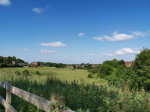Accepting Autumn
…Even as the weather passes around us, as the darkness folds over the summer world, as we may feel swept along like leaves in a wind, we are still here in the bundle of beautiful villages we can call ‘home’...
An agitation of the air,
A perturbation of the light…
(Stanley Kunitz)
I think it is not uncommon to fear the coming of the winter months. Sweeping darkness at five o’clock, evenings completely indoors, and a sun misted over – the anticipation of these can make us (unsurprisingly) uneasy. Over the last few weeks, various people in my life have commented to me that the turning of the season even causes them to feel queasy. I empathise; our inability to control the inevitable alteration of the outside can be difficult to accept. Autumn is often a border we don’t feel ready to cross; a liminal space between high, free August and frost-prickled December. Exteriorly, our landscape is changed, but with no permission from the interior landscape of our bodies.
…Admonished me the unloved year
Would turn on its hinge that night.
(Stanley Kunitz)
It’s going to get colder and we’re going to have to deal with it. Humans struggle with change.

The phrase ‘turning over a new leaf’ comes from the 16th century, where pages in books were referred to as ‘leaves’, and turning over a blank one was akin to starting afresh. Nowadays it is used most often at New Year – but its roots for me personally are in autumn. Trees swell with yellow and red, and then shed their dead, whilst those of school-age (up until this year, me) plunge into the part of the year, to them, more ‘new’ than January. They encounter new seating-plans, are made to pen new goals, improve their routines… new beginnings can feel overwhelming and untimely. Turning over the all-encompassing leaf of autumn can be something we have to work to keep up with and find the calm in. Can we ever feel completely ready?
He’s been moving back and forth,
Gathering odd bits of walnut shells and twigs,
While all about him the great fields tumble
To the blades of the thresher.
(Robert Gibb)
Like with the creature in the poem above, For the Chipmunk in My Yard, autumn hits us with new tasks and responsibilities, and a niggling feeling that the world is not quite as it was. However, the chipmunk described moves “back and forth”, balanced and prepared, even while the “blades of the thresher” are active all around it. It knows of the change, it feels the threatening air, but it accepts the bigger picture without being overcome by it, instead just performing its own mindful tasks needed for hibernation. Crucially, the poet does not deny the scariness of the season. Instead, he reassures us that this new beginning does not have to overcome us. Completing only what we can and working on acceptance of what’s beyond our control could be the key to embracing the winter months.
I think he knows I’m alive, having come down
The three steps of the back porch
And given me a good once over.
(Robert Gibb)

Similar to Gibb and his chipmunk, we’ve a resident squirrel in our garden. I saw it this morning, staring up at me defiantly, after having skilfully dug up a wad of grass, as if to say “Heck yeah, I did that!”. The squirrel knows I’m often watching it, but whizzes around, severing the garden anyway, unbothered by my judgement. I feel I can learn a lot from that – just as my eye isn’t always on the squirrel, the darkness of autumn and winter won’t always be imposing on me. In the same way that my eye contact with the creature is temporary, the season passing around me is temporary too.
Don’t talk to me of solemn days
In autumn’s time of splendor,
Because the sun shows fewer rays,
And these grow slant and slender.
(Paul Laurence Dunbar)
Usually, springtime is romanticised as the season of new beginnings – spring is our ‘natural’ place to start, a time of renewal, rebirth, cyclicality, constancy, and confidence. I’d be lying if I said it wasn’t my favourite season – but perhaps it’s useful to take some of what makes spring so comfortable and apply it to autumn. Not only can we find the calm within the season, but appreciate its beauty too.

The earth is just so full of fun
It really can’t contain it;
And streams of mirth so freely run
The heavens seem to rain it.
(Paul Laurence Dunbar)
Autumn’s gifts are an inversion of spring’s. In the latter, we obsess over signs of new growth, fresh promises, small hints of shoots signalling the summer to come. Spring is a starter, rearing only a little of its head as snowdrops appear dotted and stems peep, controlled, over plant-pot brims. The former, Autumn, is more of a main course – amassing quite suddenly with an army of new colours, a wicked wind and, often, a drenching downpour. Where poets will often revere spring for its plenty, in the poem above, Merry Autumn, Dunbar celebrates the colder season for its own bestowment of natural excess and exciting bounty. In a Saddleworth autumn, the narrow pavements overflow with crunchy leaves (playthings, for the feet), whilst from the top of a hill, boisterous red and orange bounces down in the valley. The rivers become messy with mud and twigs, but there’s no irritating urge to tidy them up – the world needs to be disordered, unclean, for a while, and it’s wonderful. We live in a place where we can don our boots and accept the transformation autumn imposes – even revel in it.

The long withered grass in the sunshine is glancing,
The bare trees are tossing their branches on high;
The dead leaves, beneath them, are merrily dancing;
The white clouds are scudding across the blue sky.
(Anne Brontë)
Yes, autumn is a new beginning, but new beginnings happen every day. Arguably, every time we step out of our front door we are beginning again, which I feel is a good way of getting used to the sensation of change. As in the tradition of dancing on May Day, at the arrival of spring, Brontë (above) invokes the same welcoming custom as autumn appears, with dead leaves “merrily dancing” instead. We can be fearful, yet celebratory – chilly, yet calm. The final lines below are from the current poet laureate, Simon Armitage, in his poem Mist. For me, they solidify the contradiction of dealing with change. Like squirrels, we can focus on our tasks, in acceptance of the wintry eye in the window nearby, knowing that its gaze is always temporary. We can find an alternative beauty in our new setting. Even as the weather passes around us, as the darkness folds over the summer world, as we may feel swept along like leaves in a wind, we are still here in the bundle of beautiful villages we can call ‘home’.
…Given time the edge of
your being will seep into its fibreless fur;
You are lost, adrift in hung water
and blurred air, but you are here.
(Simon Armitage)

Bibliography:
End of Summer by Stanley Kunitz: www.poetryfoundation.org/poems/54898/end-of-summer-56d235ce0824f
For the Chipmunk in My Yard by Robert Gibb: www.poetryfoundation.org/poems/53932/for-the-chipmunk-in-my-yard
Merry Autumn by Paul Laurence Dunbar: poets.org/poem/merry-autumn
Lines Composed In A Wood On A Windy Day by Anne Brontë: poets.org/poem/lines-composed-wood-windy-day
Mist by Simon Armitage: www.stanzastones.co.uk/




